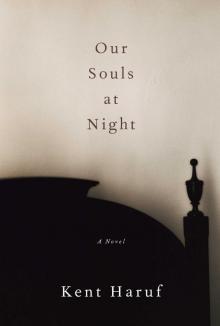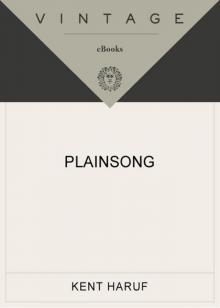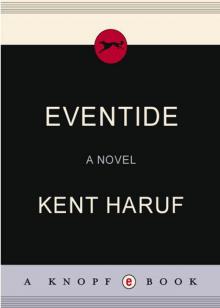- Home
- Kent Haruf
Where You Once Belonged
Where You Once Belonged Read online
KENT HARUF
WHERE YOU
ONCE
BELONGED
Kent Haruf’s The Tie That Binds received a Whiting Foundation Award and a special citation from the PEN/Hemingway Foundation. He is also the author of Plainsong, a finalist for the National Book Award, and Eventide. He lives with his wife, Cathy, in Colorado.
ALSO BY KENT HARUF
The Tie That Binds
Plainsong
Eventide
FIRST VINTAGE CONTEMPORARIES EDITION, MAY 2000
Copyright © 1990 by Kent Haruf
All rights reserved under International and Pan-American Copyright Conventions. Published in the United States by Vintage Books, a division of Random House, Inc., New York, and simultaneously in Canada by Random House of Canada Limited, Toronto. Originally published in hardcover in the United States by Summit Books, a division of Simon & Schuster, Inc., New York, in 1990.
Vintage is a registered trademark and Vintage Contemporaries and colophon are trademarks of Random House, Inc.
Part of this book was published in different form in Grand Street and Best American Short Stories 1987. It’s a pleasure to acknowledge the generous support given me by the Whiting Foundation.
Library of Congress Cataloging-in-Publication Data on file.
eISBN: 978-0-307-80785-4
Author photograph © Cathy Haruf
www.vintagebooks.com
v3.1
For three Elizabeths:
Sorel, Whitney, and Chaney
Contents
Cover
About the Author
Other Books by This Author
Title Page
Copyright
Dedication
Part One
Chapter 1
Chapter 2
Chapter 3
Chapter 4
Chapter 5
Part Two
Chapter 6
Chapter 7
Chapter 8
Chapter 9
Chapter 10
PART ONE
• 1 •
In the end Jack Burdette came back to Holt after all. None of us expected it anymore. He had been gone for eight years and no one in Holt had heard anything about him in that time. The police themselves had stopped looking for him. They had traced his movements to California, but after he had entered Los Angeles they had lost him and finally they had given it up. Thus in the fall of 1985, so far as anyone in Holt knew, Burdette was still there. He was still in California and we had almost forgotten him.
Then late on a Saturday afternoon at the beginning of November he appeared in Holt once more.
He was driving a red Cadillac now. It was not a new car; he had bought it soon after he left town when he still had money to spend. Nevertheless it was still flashy, the kind of automobile you might expect a Denver pimp or a just-made oil millionaire in Casper, Wyoming, would drive. There was all that red paint—the color of a raw bruise, say, or the vivid smear of a woman’s lipstick on a Saturday night—and all of it was shining, gleaming under the sun, looking as though he had spent an entire day polishing it for our benefit.
He drove this car, this affront and outrage to the entire town if we had known in the beginning who was driving it, drove it through Holt on Highway 34 and then turned around at the city limits and came back and drove north up Main Street past the water tower and the bank and the post office and the Holt Theater, and finally parked it on Main Street in the middle of town and didn’t get out. Instead, for the rest of that afternoon and on into the evening, he sat there as if he were waiting for something: waiting and smoking cigarettes and spitting out through the rolled-down side window onto the pavement and only now and then shifting in the front seat to relieve the pressure of the steering wheel against his gut. I suppose he thought someone in town would say something to him. But no one did. Not at first. They did not even seem to recognize him. For at least an hour his former townsmen merely passed along in front of him, shopping, going in and out of the stores on Saturday afternoon as usual, without once stopping to speak or even to pause very long to look at the Cadillac to see who owned it.
Eventually someone did think to call the sheriff, though. This was Ralph Bird, who owns the Men’s Store.
About four-thirty that afternoon Ralph Bird looked out through the front display window of the Men’s Store and noticed the red Cadillac across the street in front of the tavern. He did not think much about it at first. Pheasant season had begun and there were strange vehicles in town anyway. Thirty minutes later, though, when he looked across the street a second time he saw that the car was still there, with the man he had seen earlier still sitting alone in the front seat, and that bothered him. He began to study the car. There was nothing familiar about it. But after a minute or two he believed he detected something recognizable about the man inside. He turned and called to his wife at the back of the store.
“Hey,” he said. “Come out here a minute.”
“What do you want?”
“Come out here.”
Hannah Bird came out from the storeroom where she’d been working among the ranks of wooden shelves. She was a tall thin woman with hair dyed a dark shade of red. She stood in the doorway brushing the hair out of her eyes. “What do you want?” she said. “I’m trying to get these shoe boxes put away.”
“Look at this,” Bird said.
“At what?”
“This car. See that guy inside?”
She walked to the front of the store. “I see him.”
“What do you think about him?”
“I don’t think anything about him.”
“Keep looking.”
She looked out through the display window again. Presently while she watched, the bloated-looking man in the front seat of the shiny car turned his head to spit and now she could see the side of his face. Hannah Bird recognized him at once.
“Now don’t you do anything, Ralph,” she said. “You leave that man alone.”
“Sure,” Bird said. “I thought it was him.”
“But don’t you bother him. You don’t have any idea what that man might do.”
“He still owes me money.”
“I don’t care. You let the police handle this.”
Ralph Bird didn’t listen to her. His wife put her hand on his arm as if she meant to control him, to hold him there by force, but he brushed her hand away as though it were no more than store lint. He opened the door and stepped outside.
“Ralph,” she cried. “Ralph. You come back here, Ralph.”
Along the street it had begun to grow chill and raw. The mercury lights had come on at the street corners and there was a little breeze starting up along the pavement. Bird looked up and down Main Street; it was nearly empty of people; then he stepped off the curb and crossed the street toward Burdette’s red Cadillac. When he reached it he stopped for a moment to study the plates. The plates showed that the car had been licensed in California. Then he moved along the side toward the driver’s door. He peered in. Burdette was staring back at him through the open window.
But Burdette looked bad now. In the eight years since Bird or any one of us had seen him he’d changed for the worse. He was fat now, obese; he was sloppy and excessive; his head had grown bald and the flesh hung on him like suet. “It was like,” Bird would say later, “like for eight years he’d been feeding on cream pie and pork steak and lately he hadn’t fed at all.” Still it was Jack Burdette.
“You son of a bitch,” Bird said. “What are you doing back here?”
“That you, Bird?”
“Yeah. It’s me.”
“I seen you in the mirror. Only I had about decided you wasn’t going to speak to me. I thought you just wan
ted to admire this car.”
“I’ll speak to you,” Bird said. “I’ll speak to Bud Sealy too.”
Burdette stared at Bird, then he laughed once, loud, harsh. So his laugh hadn’t changed at all; it was the same sudden explosion that everyone remembered.
“That’s right,” Bird told him. “Go ahead. Enjoy it. You still got a few minutes.”
“Why’s that? Because you already told Bud Sealy I was here?”
“No. Because I’m going to.”
“Go ahead, then. I ain’t going nowhere. And you can tell Bud—” Burdette seemed to think. He spat once more out the window into the street, this time onto the pavement at Bird’s feet. “You can tell him I’m looking forward to seeing him.”
“You son of a bitch,” Bird said. “You goddamn—”
Then abruptly Ralph Bird stopped talking. He moved away from the car and began to walk up the street toward the corner. He turned once and looked back, then he began to trot. By the time he reached the corner he was running. At Second Street he turned and ran east toward the courthouse a block away. He ran on, his arms pumping, a small dapper middle-aged man in suit and tie, running along the dark sidewalk past the storefronts and the brick facades, and then across Albany Street and up the courthouse steps.
At the top of the steps the light in the main hallway shone out through the glass doors onto the concrete, but the doors were locked and he stood for a moment in a panic, rattling the doors and pounding on the glass. Finally it occurred to him that it was late Saturday afternoon. So he turned and stumbled back down the steps and immediately began to run again, along the high brick wall of the courthouse toward the corner of the building and then around it and along the sidewalk toward a red light above another door. This door was unlocked and he threw it open and ran down a flight of stairs to the basement. In the first office off the hallway he found Dale Willard, Holt County deputy sheriff, sitting at a desk with his feet up. Willard was clipping his fingernails.
“Where’s Bud?” Bird cried. He stood panting at the counter.
Willard looked up at him.
“Where’s Bud Sealy?”
“He’s not here.”
“I can see that. Where is he?”
“Right now? He’s at home eating his supper.”
“Then Jesus Christ, get him on the phone. Tell him to get over here.”
Willard allowed his feet to drop from the desktop and slowly he sat up in the chair. He leaned forward and began to brush the fingernail clippings from his shirtfront onto the green blotter on the desk. He was making a neat pile. “Something bothering you, Ralph?” he said. “You sound a little excited.”
“What?” Bird said.
He was still standing behind the office counter, panting and sweating, his face as red as beets and his eyes looking as though they belonged in the head of an alarmed poodle.
“Excited? Listen. By god, if you ain’t going to call him, at least reach me that phone so I can. What’s his number?”
“No. I imagine I can call him myself,” Willard said. “Soon’s I know there’s a reason to call him. Soon’s I have some idea what the hell you’re talking about.”
“What I’m talking about?” Bird said. But he was shouting now. “I’ll tell you what—” Then he seemed to catch himself; he appeared to make an effort to be calm. But it didn’t quite work, so that he began to speak now to Willard as though he were addressing an idiot. “What I’m talking about,” he said, talking too slowly, “is how that son of a bitch is back in town. That’s what I’m talking about. Now call him.”
“Sure. But which son of a bitch is that, Ralph?”
“What? You mean you—”
“I mean you haven’t said yet.”
“Well it’s Jack Burdette. Jesus Christ, you’ve at least heard of him, haven’t you? You know who he is, don’t you?”
“Yes. I know who Jack Burdette is.”
“And you know what he did, don’t you?”
“I know what he did. Everyone in Holt County knows what he did.”
“Then call Bud Sealy. Goddamn it. Here that—” But again he was shouting. The momentary restraint he had managed to place on himself had disappeared and so he was shouting once more, his face inflamed and outraged above the loosened tie. “Here that son of a bitch is back in town again and he’s driving a red Cadillac with California plates. And he’s got it parked out in front of the Holt Tavern and if you don’t quit asking me these goddamn questions and get up off your fat—”
“That’ll do,” Willard said. He stood up and leaned toward Bird. “Shut your goddamn mouth.”
“—he’s going to—What?” Bird said. “What’d you just say?”
“I said, ‘Shut your goddamn mouth.’ Now go over there and sit down. I’ll let you know if I want anything more out of you. In the meantime keep your mouth shut.”
Ralph Bird was astonished almost into peace by this. He was not used to being talked to in this way; it made him quiet. He sat down in a chair in the corner and folded his hands like a child. But his eyes were still wild.
Willard stood watching him. Finally he pulled the telephone toward himself across the desk. He dialed the number. While he listened to the phone ring he pushed the wastebasket with his foot until it was beneath the edge of the desk; then with his free hand he swept the neat pile of fingernail clippings into the trash.
When Sealy answered, Willard said. “Bud?”
“Yes.”
“Bud. Listen. Ralph Bird is in here and he …” Willard went on to tell him what Bird had said.
At his home Sealy listened to Willard talking. When Willard finished telling what he knew, Sealy asked how long ago that was and Willard told him and Sealy said had he checked any of it and Willard said no, he hadn’t checked any of it, he wanted to call first, and Sealy said he doubted it but after he’d finished eating he’d drive over to see for himself.
“In the meantime what do you want me to do with Bird?” Willard said.
“What’s wrong with him?”
“He’s still a little excited.”
“Hell,” Sealy said. “You figure it out. Take him home to his wife if you can’t contain him. At least she can feed him his supper.”
“I imagine I can contain him,” Willard said.
* * *
So it was full dark now. The streetlamps shone clearly at the corners of town, making pale circles of light on the pavement under the trees. It was that brief anticipatory moment between six and seven o’clock on a November evening when the shops on Main Street have all been closed for the weekend, when the high-school kids haven’t yet begun to race up and down Main Street, when even the Holt Tavern is quiet before the Saturday night rush and out along the highway there are only three or four men sitting quietly, drinking at the bar in the American Legion.
At home, after he’d talked to Deputy Willard, Bud Sealy finished his supper. Then he rose and walked outside into the dark in front of his house. The stars had come out and, looking at them, he belched once and felt better. Then he lit a cigarette and got into the sheriff’s car parked in front of his house and drove north two blocks onto Highway 34, then north again onto Main Street.
Driving up Main Street he passed the water tower and the bank and the post office and the theater, just as Burdette had done two or three hours earlier, and soon, a block ahead of him, he could see the red Cadillac parked at the curb in front of the tavern. He slowed. When he reached the Cadillac he parked the sheriff’s car behind it so that whoever was driving the Cadillac wouldn’t escape. He released the strap over his gun and got out.
But Burdette didn’t appear to have escape or anything else on his mind. He was still sitting in the front seat. He was slumped down massively in the seat and his head was thrown back against the headrest. The light from the corner lamp shone palely onto his big face and jaw.
Sealy examined him for a moment. Finally he tapped with his fingers on the roof of the car. Inside the car Burdette opened his
eyes and rolled his head, looking up at Sealy as if the sheriff were of no interest to him whatsoever.
“Well,” Sealy said. “So you come back, did you?”
“That’s right,” Burdette said. “I come back.”
“Hell of a deal.”
“That’s what I think. I’ve been sitting here trying to remember what for.”
“That so?” Sealy said. “I thought you was smarter than that. I thought you had it all figured out.”
“I did once. But I seem to of forgot what a little piss ant place this is. I can’t seem to recall now what I wanted here.”
“No? Well I imagine we haven’t changed so much. Not so you’d notice it anyway. We still get a little upset when somebody does something wrong to us. And afterward decides to disappear.”
“That was a long time ago,” Burdette said.
“Sure it was. But not long enough, don’t you see? And that surprises me. Because I can’t imagine what in hell you was thinking of. But I know one thing: you made a mistake coming back here. You never should of did that. Now get out of the car.”
Burdette didn’t move. “You can’t do anything to me,” he said. “It’s been eight years. The statute’s already run out.”
“You been talking to lawyers?”
“I talked to a couple of them.”
“You wasted your time. That don’t mean anything. That don’t mean diddly-shit.”
“Sure it does. It’s the same everywhere.”
“No,” Sealy said. “It don’t mean a thing.” He opened the car door. “Now listen to me. I’m through talking. I already been nice.”
Burdette refused to move. He sat slumped against the steering wheel of the Cadillac, his head lolled back against the headrest.
“Okay, then,” Sealy said. “I told you once. I did do that much.” He withdrew the gun from its holster on his belt and suddenly he jammed the short barrel into Burdette’s ear.
Burdette sat up. He tried to move his head away. But Sealy followed his head with the gun.
“Jesus Christ,” Burdette said. “What in hell you think you’re doing?”

 Our Souls at Night
Our Souls at Night Plainsong
Plainsong Eventide
Eventide Where You Once Belonged
Where You Once Belonged The Tie That Binds
The Tie That Binds Benediction
Benediction